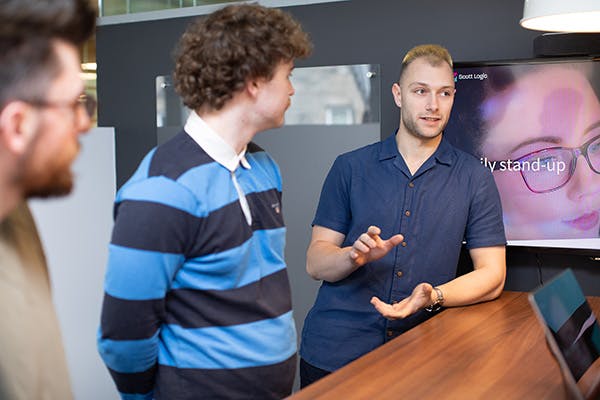Designing for Neurodiversity
UX designers should put ALL users at the heart of design. Mark Wallace explains how you can integrate neurodiversity considerations into a fully inclusive design process.

Mark Wallace

Shape a clear product vision through a deep understanding of user needs, pains and goals, and keep the user engaged throughout delivery to give your product the best chance of success.
User research during the discovery phase of a project can often be seen as a ‘nice to have’. However, the negative consequences of skipping this activity can be wide-ranging – everything from difficulty in prioritising features during development, to increased customer support issues post-launch, through to reputational damage when the product/service fails to meet users’ needs.
Moreover, it’s all too easy for technical constraints or organisational workflows to define how a product or service is developed. This is to put the cart before the horse – the user must come first. The critical success factor of any product or service is how well it meets user needs.
Our expert consultants guide you through our proven approach to gain a deep understanding of your users rapidly: who they are as people, what they are trying to do, and how. We have nearly two decades of experience helping large institutions and small organisations move from loose ideas to clear direction.
Mapping your users’ goals, tasks and pains through concise user research during discovery will de-risk your project and set it up for success. You can then build systems and services that accurately reflect users’ workflows rather than your own.

Our approach helps you validate your intentions rapidly. In this way, we can deliver a project designed to meet real user needs and generate a real-world impact – or help you avoid wasting significant amounts of time and money on a project that user research shows will not succeed.

We believe that quality checks must be built into every stage to prevent work from repeatedly returning to earlier phases. Through automation, we create a seamless flow that reduces delays and improves the overall efficiency of our development process.

It won’t be months before you get real value. We present working software to users iteratively, capturing feedback that grows your understanding of users’ needs continually, and informs the next iteration.

We pride ourselves on our pragmatic approach. With Scott Logic, you can trust us to recommend what works, rather than the latest hot trend or hyped technology.
Find out how we have helped clients like you with tailored support to tackle technology challenges and achieve business goals.

How we helped Westmorland and Furness Council's Digital and Family Help Teams find clarity and reduce operational pressure through the collaborative service design of flexible and scalable virtual hubs.

How we helped Newcastle Building Society to design and deliver a new white-label, cross-platform savings app – shaped by stakeholder and user research – while establishing firm foundations in the cloud.
Our tried-and-tested solutions
While our approach is always tailored to your needs, we have a range of tried-and-tested solutions that speed up delivery and drive a successful outcome.

Whether you’re creating a new product or iterating on an existing system, our tailored Discovery methodology helps you deliver early value, manage uncertainty, and respond rapidly to changing market demands.

We engage with your users and stakeholders across your organisation to establish a deep understanding of users’ goals, tasks and pains to inform the direction and efficacy of your product or service.

We ensure that the user is central to each stage of the project. By taking an iterative and incremental approach to delivery, we test releases of working software with users to evaluate how well existing or new experiences meet their needs.
Ryan Gallacher, Senior UX Designer, highlights the critical role of UX during the Discovery phase and emphasises that UX design should be a continuous process throughout delivery. He explores why upfront research provides valuable direction but cannot predict every detail, and why ongoing UX involvement is key to adapting to market changes and evolving user needs.
UX designers should put ALL users at the heart of design. Mark Wallace explains how you can integrate neurodiversity considerations into a fully inclusive design process.

Mark Wallace
Oded Sharon shares a detective‑style debugging story, uncovering how strict security constraints, legacy quirks and unexpected UI behaviour led to creative problem‑solving and a cleaner, more maintainable solution.

Oded Sharon
While traditional methods have made progress in accessibility testing, there's plenty of room for innovation, particularly with AI. This blog explores whether LLMs can harnessed to improve accessibility testing.

Remi Van Goethem
If you’d like to discuss how our specialists can support you in gaining a deep understanding of your users and setting your product/service up for success, we’re always happy to chat.